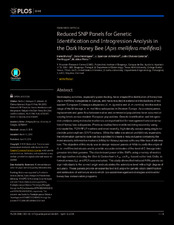| dc.creator | Muñoz, Irene | |
| dc.creator | Henriques, Dora | |
| dc.creator | Johnston, J. Spencer | |
| dc.creator | Chávez-Galarza, Julio | |
| dc.creator | Kryger, Per | |
| dc.creator | Pinto, M. Alice | |
| dc.date.accessioned | 2015-08-28T21:52:05Z | |
| dc.date.available | 2015-08-28T21:52:05Z | |
| dc.date.issued | 2015-04-13 | |
| dc.identifier.citation | Muñoz I, Henriques D, Johnston JS, Chávez-Galarza J, Kryger P, Pinto MA (2015) Reduced SNP Panels for Genetic Identification and Introgression Analysis in the Dark Honey Bee (Apis mellifera mellifera). PLoS ONE 10(4): e0124365. doi:10.1371/journal.pone.0124365 | en |
| dc.identifier.uri | https://hdl.handle.net/1969.1/154839 | |
| dc.description.abstract | Beekeeping activities, especially queen trading, have shaped the distribution of honey bee (Apis mellifera) subspecies in Europe, and have resulted in extensive introductions of two eastern European C-lineage subspecies (A. m. ligustica and A. m. carnica) into the native range of the M-lineage A. m. mellifera subspecies in Western Europe. As a consequence, replacement and gene flow between native and commercial populations have occurred at varying levels across western European populations. Genetic identification and introgression analysis using molecular markers is an important tool for management and conservation of honey bee subspecies. Previous studies have monitored introgression by using microsatellite, PCR-RFLP markers and most recently, high density assays using single nucleotide polymorphism (SNP) markers. While the latter are almost prohibitively expensive, the information gained to date can be exploited to create a reduced panel containing the most ancestry-informative markers (AIMs) for those purposes with very little loss of information. The objective of this study was to design reduced panels of AIMs to verify the origin of A. m. mellifera individuals and to provide accurate estimates of the level of C-lineage introgression into their genome. The discriminant power of the SNPs using a variety of metrics and approaches including the Weir & Cockerham’s FST, an FST-based outlier test, Delta, informativeness (In), and PCA was evaluated. This study shows that reduced AIMs panels assign individuals to the correct origin and calculates the admixture level with a high degree of accuracy. These panels provide an essential tool in Europe for genetic stock identification and estimation of admixture levels which can assist management strategies and monitor honey bee conservation programs. | en |
| dc.description.sponsorship | The open access fee for this work was funded through the Texas A&M University Open Access to Knowledge (OAK) Fund. | en |
| dc.publisher | PLOS | |
| dc.rights | Attribution 3.0 United States | en |
| dc.rights.uri | http://creativecommons.org/licenses/by/3.0/us/ | |
| dc.subject | Honey bees | en |
| dc.subject | Introgression | en |
| dc.subject | Invertebrate genomics | en |
| dc.subject | Conservation genetics | en |
| dc.subject | Europe | en |
| dc.subject | Genome analysis | en |
| dc.subject | Evolutionary genetics | en |
| dc.subject | Population genetics | en |
| dc.title | Reduced SNP Panels for Genetic Identification and Introgression Analysis in the Dark Honey Bee (Apis mellifera mellifera) | en |
| dc.type | Article | en |
| local.department | Entomology | en |



